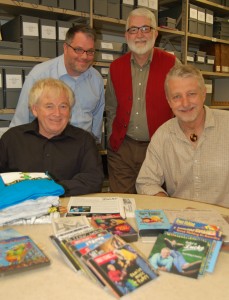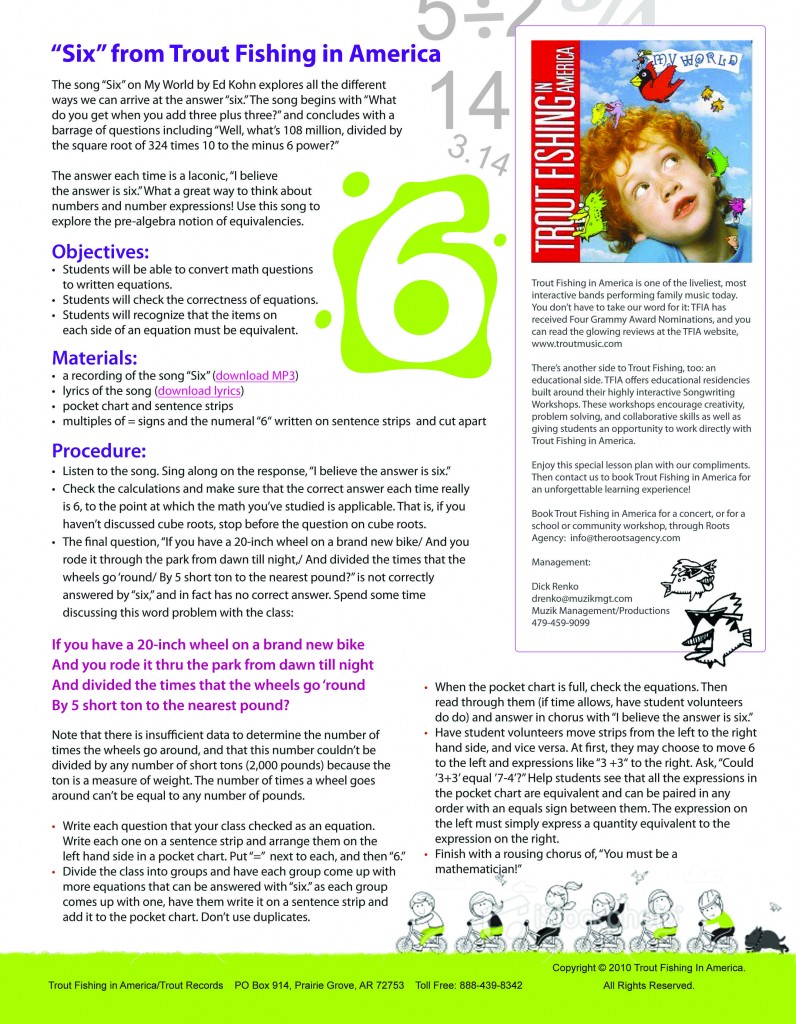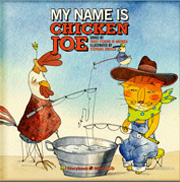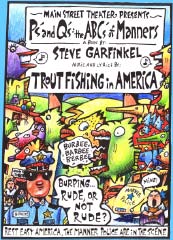from Today’s Man magazine
Ezra Idlet built a tree house – not a small house up in a tree for kids’ campouts, but a 540 square foot house a mile from the home where he lives, with original art works in stained glass and metal. Idlet had thought about it for two years, written a song about it, and has been working on it for six years now.
Keith Grimwood started playing in Big Bands at the age of 15, earned a degree in music, and spent two years performing with the Houston Symphony. He tries, he says, not to let his education get in his way.
Together, Idlet and Grimwood are Trout Fishing in America, the Grammy nominated Arkansas band best known for their music for children. If you have kids, you probably know and love songs like “My Hair Had a Party Last Night” and “When I was a Dinosaur.” If not, it’s time you got to know Trout Fishing’s music.
Idlet was born in San Antonio, Texas, and spent time in Baltimore and Houston before relocating to Prairie Grove eighteen years ago. “I love living in Arkansas,” says Idlet. “I really do. I’ve grown more here as an artist and as a man than anywhere else I’ve lived.” Grimwood came, too, and they’ve chosen Arkansas as their home.
Idlet and Grimwood first played together as members of St. Elmo’s Fire, an eclectic folk rock band which had (with their original name, Wheatfield) been featured on Austin City Limits, written two rock ballets, and played a six week gig in the Virgin Islands. Grimwood joined temporarily in 1976 when the Houston Symphony went on strike and never returned to the symphony. When the band dissolved in 1979, Trout Fishing in America was born.
They started playing on the street in Santa Cruz, having ended up there when St. Elmo’s Fire disbanded. Since then, they’ve toured extensively and produced 15 albums. They won a 1992 Indie Award for “Pop Album of the Year” with their album Over the Limit, and won twice more, in 1994 and 1997. They’ve received numerous Parents Choice Awards, and have been nominated for Grammy awards four times. In 2008, Performing Songwriter Magazine named Trout Fishing in America one of the 100 most influential independent artists of the past fifteen years. They’ve been inducted into the Kerrville Folk Festival’s Hall of Fame and made a performance video shown on PBS stations.
“Awards look great in your press kit,” says Idlet. “They’re validation from your peers. But the most important thing is that Keith and I are still friends and we’re working musicians. If you can do what you love and take care of your responsibilities, that’s success.”
In recent years, Trout Fishing has offered songwriting workshops for students and for teachers. Trout Fishing first played in schools as a favor to friends who taught school, and they loved it. Then, when they had children of their own, they started writing music for kids.
Their songs appeal to children and yet are sophisticated enough for adults to enjoy as well. “We try to blend the serious with the silly,” says Idlet, and their high energy live performances are consistent favorites with families.
When they began teaching songwriting at schools, they started with a workshop for 200 student teachers. The next one was for 35 middle school students. They love the variety. “Best gig in the world,” says Idlet. “It shows kids the possibilities of creativity. Instead of something that only certain people can do, creativity becomes something that’s within their reach.”
The current 21st Century Skills movement in schools values creativity and has made schools receptive to Trout Fishing’s message. “Creativity is necessary in our lives, whether it’s writing a poem or solving problems creatively,” says Idlet. “The kids get to make noise, to laugh, and to look at things in different ways.”
Teachers, too, get to learn new approaches to their work from the workshops devoted to teachers. Dick Renko of Muzik Management/Productions, Trout Fishing’s business manager , describes the songwriting workshops as “life-changing .” The musicians find their educational workshops transformative, too. “To teach somebody to do something you do,” Idlet explains, “you have to define exactly what it is that you do.”
That may be easier said than done for this highly creative band. The duo recently published a picture book, complete with CD, called My Name is Chicken Joe. They’ve finished writing the second in the series, Chicken Joe Forgets Something Important. The manuscript is now with their illustrator. The second book will also have a CD with it, and there may be more books in the series as well.
The band has a new CD coming out, too. This one, Lookin’ at Lucky, is intended for adults. “There’s nothing on it that’ll make your kids’ ears catch on fire,” Idlet assures his fans, and the CD doesn’t signal a complete change of direction. “We had songs stacking up, and it felt like an adult project was coming on.” This album was recorded at the Trout House, which Idlet describes as “a small room packed with musical instruments and digital equipment.” The digital equipment made it possible for Trout Fishing to work on the new CD both with local musicians and with people at a distance.
New technologies have also made changes in the way Trout Fishing does business. “We’re musicians, but we’re also businessmen,” says Idlet. The music industry has been changed by file sharing on the internet, and Trout Fishing is “still adjusting to doing business in the 21st century,” Idlet acknowledges. “How to incorporate that sharing into a positive thing for the band is the challenge. I’m really enthusiastic about the prospects.”
This agility and adaptability are part of the Trout Fishing formula for success. Idlet denies that there was ever really a formula for success, though. “I could never in my wildest dreams have predicted what we’ve had happen to us and what we’ve done.”
Idlet credits passion and hard work for the band’s success. “It’s hard not to be happy when getting up and going to work means playing the guitar,” he acknowledges, but he says he likes to work hard at other things, too. He gardens, chops wood, and makes pickles, among other things. “If cattle ranching is your passion, that’s what you’ll do,” he says. “If music is your passion, then you’ll pursue that. You’ve got to need it more than anything else.”















